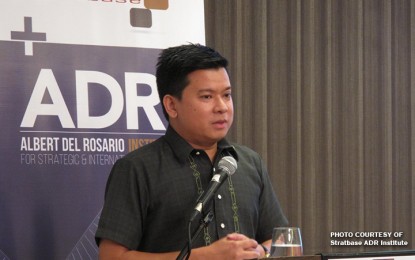
PCOO Assistant Secretary Michel Kristian Ablan. (File photo)
MANILA -- Public access of information to all branches of government is a must, an official of the Presidential Communications Operations Office (PCOO) said Friday.
PCOO Assistant Secretary Michel Kristian Ablan made the statement as he reiterated the executive branch’s call on Congress to pass a measure that would allow Filipinos to get access to public documents in the legislative and the judiciary.
“We need to have FOI in all of government,” Ablan, executive director of the FOI-Project Management Office, said during the launch of the “Duterte Legacy” campaign at the Philippine International Convention Center in Pasay City. “(To) all our legislators, finally pass the FOI (Freedom of Information) bill and make it into law to include them, the judiciary, the local government units, as well as the constitutional commissions.”
At present, the public can also access official documents and transactions in all state departments and offices under the executive branch.
On July 23, 2016, President Rodrigo Duterte inked Executive Order (EO) 2 on FOI that allows all Filipinos to obtain documents and records from public offices, in an effort to promote transparency in the government under his watch.
Under EO 2, a Filipino citizen can request any information about government transactions and operations by presenting proof of education to the concerned state office or lodging queries online through the official website www.foi.gov.ph.
An FOI request can be made before all government offices under the executive branch, including government-owned or -controlled corporations (GOCCs), and state universities and colleges (SUCs).
Requesting parties can have access to information, official records, public records, and documents and papers on official acts, transactions or decisions, as well as government research data used as basis for policy development.
Ablan lamented that Congress has yet to pass an FOI bill that will effectively expand the coverage of Duterte’s EO 2 by including the legislature and the judiciary.
“Ever since we had the 1987 Constitution, congressperson after congressperson, senator after senator have filed Freedom of Information Bill in Congress. They have not passed one until today,” Ablan said.
“For various reasons, there have been challenges. It has been very difficult for our congressional leaders to pass the FOI bill that it took a president in the person of President Rodrigo Duterte to think out-of-the-box and sign Executive series of 2016 as a declaration that we can operationalize citizens’ right to information in the executive branch,” he added.
69 percent of offices under executive branch ‘FOI-compliant’
Despite Congress’ failure to push for the passage of the proposed FOI Law, Ablan noted that 69 percent of all government offices under the executive department is “FOI-compliant”.
From 2019, nearly 100 percent of national government agencies, 43 percent of GOCCs, 96 percent of SUCs, and 41 percent of local water districts have complied with the implementation of the EO on FOI, Ablan said.
He said there have been 29,490 paper-based requests and 18,036 online requests submitted to government offices as of 2019 and the executive branch was able to respond to “five out of 10” FOI requests.
Ablan expressed hope that by the end of 2020, all state agencies would respond to public requests to access documents in their respective offices.
“We are now proud three years in implementing the President’s directive that almost all of the government has answered the call of the President to be transparent and to be open to the people,” he said. (PNA)
